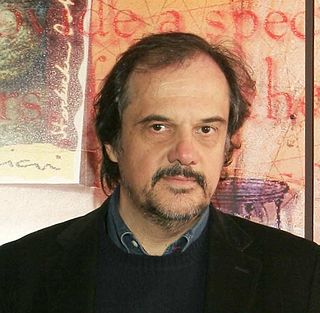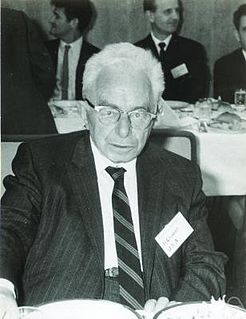A Quote by Ian Stewart
...a major triumph of mathematical imagination: the use of visual imagery to condense a large quantity of information into a single comprehensible picture... Mathematicians are just beginning to understand these basic building blocks of change and to analyze how they combine. The methodology involved has a very different spirit from traditional modeling with differential equations: it is more like chemistry than calculus, requiring careful counterpoint between analysis and synthesis.
Quote Topics
Analysis
Analyze
Basic
Beginning
Between
Blocks
Building
Building Blocks
Calculus
Careful
Change
Chemistry
Combine
Counterpoint
Different
Differential
Differential Equations
Equations
How
Imagery
Imagination
Information
Involved
Just
Just Be
Large
Like
Major
Mathematical
Mathematicians
Methodology
Modeling
More
Picture
Quantity
Single
Spirit
Synthesis
Than
Traditional
Triumph
Understand
Use
Very
Visual
Visual Image
Visual Imagery
Related Quotes
Every attempt to employ mathematical methods in the study of chemical questions must be considered profoundly irrational and contrary to the spirit of chemistry.... if mathematical analysis should ever hold a prominent place in chemistry -- an aberration which is happily almost impossible -- it would occasion a rapid and widespread degeneration of that science.
Mathematicians can and do fill in gaps, correct errors, and supply more detail and more careful scholarship when they are called on or motivated to do so. Our system is quite good at producing reliable theorems that can be solidly backed up. It's just that the reliability does not primarily come from mathematicians formally checking formal arguments; it comes from mathematicians thinking carefully and critically about mathematical ideas.
As for mathematicians themselves: don't expect too much help. Most of them are too far removed in their ivory towers to take up such challenges. And anyway, they are not competent. After all, they are just mathematicians-what we need is paramathematicians, like you... It is you who can be the welding force, between mathematicians and stories, in order to achieve the synthesis.
The spider-mind acquires a faculty of memory, and, with it, a singular skill of analysis and synthesis, taking apart and putting together in different relations the meshes of its trap. Man had in the beginning no power of analysis or synthesis approaching that of the spider, or even of the honey-bee; but he had acute sensibility to the higher forces.
Mathematics as an expression of the human mind reflects the active will, the contemplative reason, and the desire for aesthetic perfection. Its basic elements are logic and intuition, analysis and construction, generality and individuality. Though different traditions may emphasize different aspects, it is only the interplay of these antithetic forces and the struggle for their synthesis that constitute the life, usefulness, and supreme value of mathematical science.
Through and through the world is infested with quantity: To talk sense is to talk quantities. It is no use saying the nation is large. . . . How large? It is no use saying the radium is scarce. . . . How scarce? You cannot evade quantity. You may fly to poetry and music, and quantity and number will face you in your rhythms and your octaves.
Accordingly, we find Euler and D'Alembert devoting their talent and their patience to the establishment of the laws of rotation of the solid bodies. Lagrange has incorporated his own analysis of the problem with his general treatment of mechanics, and since his time M. Poinsôt has brought the subject under the power of a more searching analysis than that of the calculus, in which ideas take the place of symbols, and intelligent propositions supersede equations.
Like music or art, mathematical equations can have a natural progression and logic that can evoke rare passions in a scientist. Although the lay public considers mathematical equations to be rather opaque, to a scientist an equation is very much like a movement in a larger symphony. Simplicity. Elegance. These are the qualities that have inspired some of the greatest artists to create their masterpieces, and they are precisely the same qualities that motivate scientists to search for the laws of nature. LIke a work of art or a haunting poem, equations have a beauty and rhythm all their own.
For a generation that gets most of its information off a computer screen (be it Facebook, Instagram, YouTube, Twitter or what have you), an athlete has to be very careful about the public/private aspect of that. Be careful not to be overly critical, be careful with use of language, and understand the whole world is watching.


































